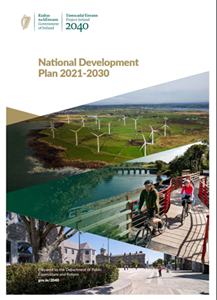
NDP investment in hospitality and tourism

While the pandemic has had a devastating impact on the sector, it is resilient and will rebound. It is critical that Government and industry stakeholders invest in targeted infrastructure to ensure that Ireland remains attractive from a tourism perspective and captures a growing share of international visitors.
 We welcome the announcement of the €165bn National Development Plan 2021-2030 (NDP), which is the largest and greenest ever in the history of the State. The plan sets out the framework and broad direction for investment priorities to 2030. It recognises the value of tourism within Ireland and in particular its contribution to the sustainability of cities, towns, villages and rural areas around the country.
We welcome the announcement of the €165bn National Development Plan 2021-2030 (NDP), which is the largest and greenest ever in the history of the State. The plan sets out the framework and broad direction for investment priorities to 2030. It recognises the value of tourism within Ireland and in particular its contribution to the sustainability of cities, towns, villages and rural areas around the country.In this article we examine the investment priorities identified in the NDP. The key tourism-related components of the plan are aimed at continuing to deliver on the commitments set out in the Linking People and Places plan for capital investment in transport, tourism and sport 2018-2027. The plan has strategic importance for both international and domestic tourism.
High-quality international access
The NDP calls for high-quality international connectivity for airports and ports and has allocated a €4.8bn investment toward this. As an island nation, this connectivity is essential to attracting international visitors. COVID-19 has negatively impacted our connectivity and it is critical for the recovery of the tourism industry that we re-establish and grow our international access routes.
The strategic projects identified include:
- The development of Dublin Airport’s second runway, which is budgeted to cost €320m. A new visual control tower will bring the total expenditure to €370m. The new runway offers a 31% gain in connectivity by 2034. DAA forecast that it will contribute an additional 31k jobs and €2.2bn to the economy by 2043 (DAA). The runway is necessary in facilitating future passenger growth as well as helping to position the airport as a key gateway connecting North America to Europe, and it will contribute significantly to the national tourism product.
- The continued support for Cork and Shannon airports in their roles as gateways for their respective regions.
- A once-off Regional State Airports Programme (€16.3m), of which €10m was designated to the reconstruction of Cork airport runway which reopened on 24 November 2021.
- There is continued support for the smaller regional airports of Donegal, Kerry and Knock under the Regional State Airports Programme
2021-2025.
Connectivity
A number of important transport initiatives which will have a positive tourism benefit include:
- MetroLink, which will provide providing high-quality public transport from Dublin Airport to Dublin City Centre.
- Enhancing the train fleet on the Dublin to Belfast route, which will improve the connectivity between the two biggest cities on the island.
- Keeping the regional and local road network in good repair, along with targeted improvements to sections of the network.
Greenways (walking and cycling routes)
The Government has committed €360m annually up to 2025 for Active Travel, which includes walking and cycling routes. Some of the projects which are currently progressing include the Mahon to Marina Greenway (Cork), the Castletroy Greenway (Limerick) and the Broadmeadow Greenway (North Dublin). Other key greenways include Galway to Dublin, to be completed by 2026, and the Royal and Grand Canal Greenways, to be completed by 2025.The development of greenway infrastructure has yielded significant tourism benefits for the surrounding regions. For example, the completion of the Waterford Greenway resulted in the opening of a new hostel, eight B&Bs, eight restaurants and five bike hire firms, creating at least 139 new jobs.
Cultural and heritage amenities
In 2019 Fáilte Ireland launched a capital scheme focused on developing immersive heritage and cultural attractions. This was focused on attractions that appeal to overseas visitors looking for experiences that help them to connect with Ireland and bring the country’s culture, heritage and people to life. It targeted projects that have the greatest potential to grow tourism across Ireland throughout the year.
The NDP builds on this theme, identifying strategic investments in national cultural institutions, national parks, visitor facilities and large-scale sport infrastructure. Projects identified include:
- Ongoing maintenance and development of the 87,000-hectare National Parks and Nature Reserves Network across 80 sites, servicing over 4m visitors annually.
- Completion of the conservation of the Moore Street National Monument.
- Continued investment in the Heritage Council and its programmes.
- Growing built heritage capital grant schemes providing grant aid to historic buildings.
- Delivery of the Cork event centre, to be delivered in partnership between the local authority and the private sector.
Strengthening our brand and regional focus
The NDP recognises the important economic benefits of tourism to the development of rural Ireland, particularly in regions that lack an intensive industry base or are economically fragile. Investment in our international tourism marketing infrastructure is key to stimulating business from overseas markets. A number of specific initiatives have been identified, including:
- €108m allocated to Fáilte Ireland for investment in tourism product development.
- Continued support and development of the existing brands: Wild Atlantic Way, Ireland’s Hidden Heartlands, Ireland’s Ancient East, and Dublin.
- Investment in activity-based tourism such as the Greenways.
- Investment in historical and heritage sites that provide important tourist experiences.
With over 80 years’ experience in the Irish hospitality industry, Crowe’s dedicated hotel, tourism and leisure team is uniquely qualified to offer financial, operational and strategic support to help hospitality businesses navigate the opportunities and challenges presented by the changed landscape. To find out how we can help your business, contact a member of our hotel, tourism and leisure team today.


